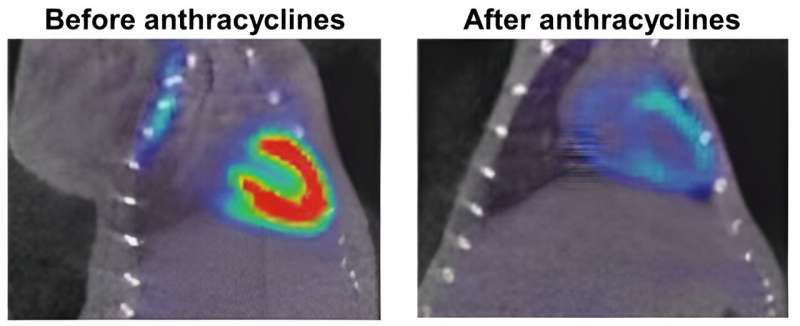This article has been reviewed according to Science X's editorial process and policies. Editors have highlighted the following attributes while ensuring the content's credibility:
fact-checked
proofread
Scientists identify targets to protect against anthracycline-induced cardiotoxicity

Scientists at the Centro Nacional de Investigaciones Cardiovasculares (CNIC) have identified the mechanisms through which anthracyclines, a widely used class of anticancer drugs, damage the hearts of patients receiving this treatment. The study, published in the journal JACC: CardioOncology, also identifies possible treatments for this complication, which affects an estimated one-third of cancer survivors.
More than 4 million people in Europe are diagnosed with cancer every year. Fortunately, survival rates have increased significantly thanks to improved treatments and advances in diagnosis.
Anthracyclines, used in combination with other drugs, have been established for many decades as drugs of choice in the first-line treatment of many types of cancer. An estimated 3 million patients are treated with anthracyclines in Europe every year. Unfortunately, these drugs are cardiotoxic, and a third of patients treated with anthracyclines develop some degree of cardiac injury.
In many patients, the toxic effects do not have serious long-term consequences; however, in more than 5% of cancer survivors, the irreversible cardiac injury caused by anthracycline therapy leads to chronic heart failure, severely limiting quality of life
Although anthracycline-induced cardiotoxicity has been known about for many years, no specific cotreatments have been developed to protect the heart against injury during cancer therapy. This is in part due to the incomplete understanding of the molecular mechanisms through which anthracyclines damage the heart.
Now, researchers in Translational Laboratory for Cardiovascular Imaging and Therapy at the CNIC, led by Dr. Borja Ibáñez, have identified the underlying mechanisms through a detailed analysis of the progressive effects of anthracycline therapy on cardiac metabolism in an experimental animal model, with particular emphasis on mitochondria.
"The heart beats without interruption throughout life and has one of the most intense energy requirements of any organ in the body. This unceasing activity requires a continuous supply of energy, and any failure in the energy production chain has major consequences," said Dr. Ibáñez, who is CNIC Scientific Director, a cardiologist at Fundación Jiménez Díaz university hospital, and a group leader in the Spanish cardiovascular research network (CIBERCV).
"Mitochondria are power plants within cells that generate energy continuously by consuming fuel substrates, mostly fatty acids and glucose. In the study, we saw that anthracyclines alter cardiac metabolism, causing a change in the supply of these fuels and an irreversible dysfunction in energy production by mitochondria."
"We observed that the metabolic changes in the heart occur very early after the initiation of anthracycline treatment, long before any loss of contractile function," explained first author Anabel Díaz-Guerra, a pre-doctoral fellow at the CNIC. "We found that, as a consequence of these metabolic alterations, the heart begins to atrophy (its cells lose volume) in one of the first signs of irreversible damage."
These findings are especially important because the changes appear long before cardiac alterations can be detected by conventional means, stressed Dr. Laura Cádiz, a member of the CNIC research team.
"By minutely studying each stage of the process, we were able to identify the molecular alterations underlying the deterioration in cardiac metabolism. And this in turn allowed us to identify steps in the process that could be prevented by very early interventions."
One possible intervention involves a specific dietary adjustment, and the team is currently investigating the ability of a protein-enriched diet to prevent muscle atrophy, including cardiac muscle atrophy, induced by anthracycline chemotherapy.
This project is in part a continuation of Dr. Ibáñez's earlier work on nutritional approaches to preventing cardiotoxicity in cancer treatments, for which he was awarded the Fundación Jesús Serra clinical research prize.
"Reflecting our translational research vision, our ultimate goal is to test new therapeutic targets in patients at risk of anthracycline-induced cytotoxicity. Right now, we are studying the effect of a dietary intervention in the same experimental model, and if the encouraging preliminary results are confirmed this will be pursued in a clinical trial," said Dr. Ibañez.
The CNIC is committed to finding solutions to unresolved clinical needs and, within its Myocardial Homeostasis & Cardiac Injury program, has set up a research line dedicated to chemotherapy-associated cardiotoxicity, with a particular focus on anthracyclines. The goal is to develop treatments that maintain the efficacy of the anticancer treatment while minimizing negative impacts on cardiovascular health.
Dr. Ibañez's research group also coordinates projects financed by the European Commission (ERC-Consolidator "MATRIX" and Horizon2020-HEALTH "RESILIENCE"), both aimed at reducing the prevalence of heart failure among cancer survivors. Imbued with a translational and multidisciplinary vision, these projects are being conducted through partnerships between the CNIC, Fundación Jiménez Díaz University Hospital, and the CIBERCV.
More information: Evolution Of Myocardial Metabolism and Mitochondrial Quality Control During Anthracycline-Induced Cardiotoxicity: Novel Therapeutic Targets Identification, JACC: CardioOncology (2024).



















